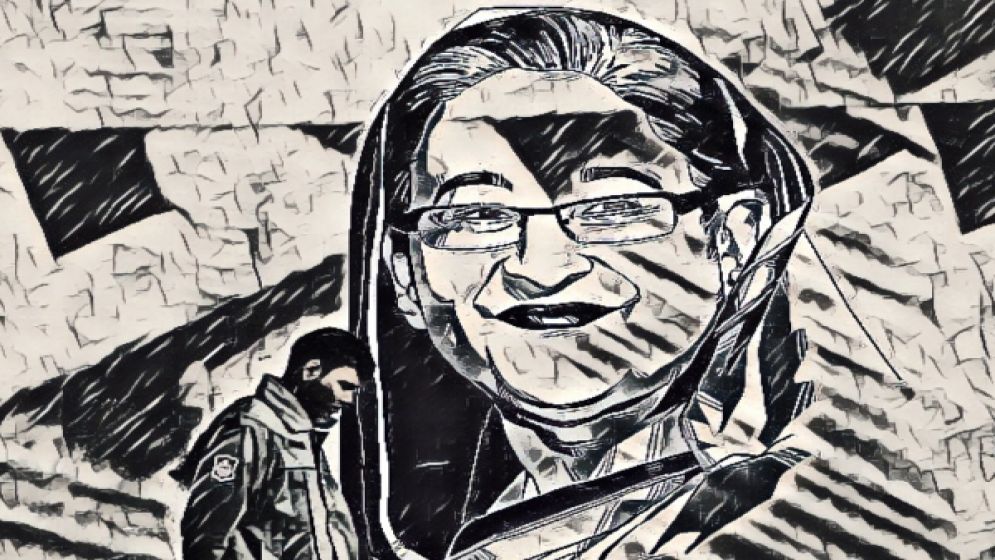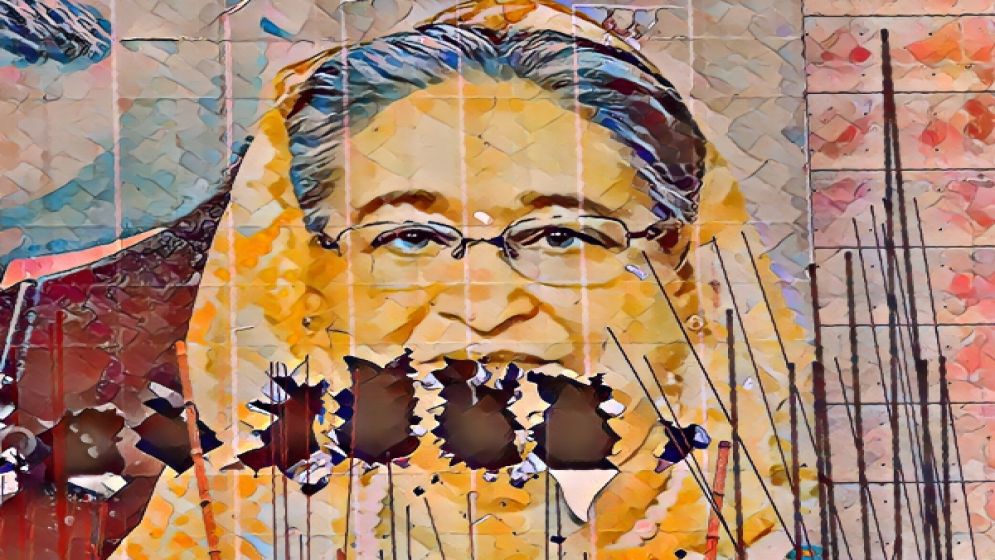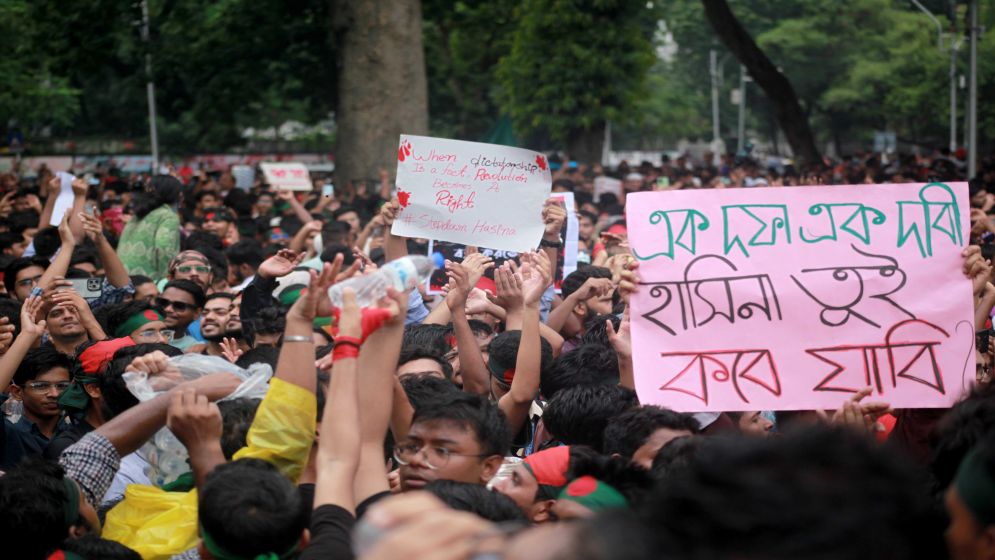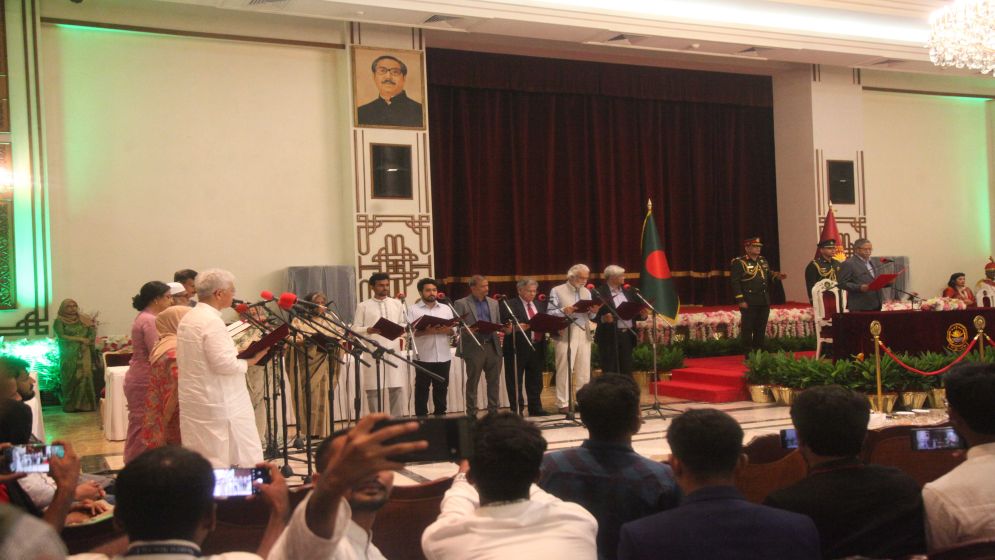Hasina’s tyrannical rule has left a gaping political and economic hole which the interim government's assumed approaches cannot fill

Sheikh Hasina's disgraceful departure from power has brought jubilation among the people, as it marks the end of a 15-year period of authoritarian rule that impacted everyone—from the highest echelons of society to the most ordinary citizens—except for a few who benefitted from maintaining a tyrant in power for their own gain and survival.
However, the disruption caused to the very fabric of society is profound, and its full impact is still unfolding. Currently, the interim government led by Muhammad Yunus is working to address the damage, but the political and economic void left by Hasina's rule and her subsequent departure cannot be resolved quickly.
Allow me to explain why this is the case.
Corruptions, chaos, and lack of incentives
1: Corruption, embezzlement, and extortion have been prevalent in Bangladesh since the colonial period or even before, during the Sultanate and Mughal periods. However, in the past 15 years, the Awami League has engaged in such a degree of corruption, lawbreaking, and moral degradation that it has brought about a qualitative change in the system of corruption.
Important state institutions, such as the Supreme Court or the Bangladesh Bank, which used to function reasonably well, have now become entangled in a feast of exploitation by their own leeching personnel.
In every sector, they are creating such a perverse incentive structure that the most extreme and greedy individuals rise to the top, while those who are somewhat normal are compromised to the extent that they lack the moral strength to stand against it. Essentially, the entire system is horrifically corrupted from top to bottom.
2: The Awami League’s thugocracy or gangster rule can be called mafia rule, but even mafia empires usually have a more institutional structure. With unfair advantages and deals to sell out the country to India, they have effectively removed the electoral system from the country, so there’s no need to think much about the people.
-66cc22b1bc47e.jpg)
In the past 15 years, especially since 2014, the primary job of the Awami League has been to oversee the thieves, ensure that one thief does not clash with another, prevent the police from interfering with the Rapid Action Battalion (RAB), and ensure that there is an understanding between the thieves of the WASA and the City Corporation.
With the sudden departure of the Awami League from power, there is a significant disruption in this understanding among the thieves. They are now coming together in various ways to sabotage different national tasks.
Besides this, Sheikh Hasina, while abroad, will try to create various forms of instability with the help of the cronies left behind in the country, scattered intellectuals, and other agents, as well as with the cooperation of the Indian government.
This will include creating instability by starting movements for rights outside of context, and engaging atheists in religious disputes. Additionally, since right-wing Islamist politics in Bangladesh has its own political rationales, external pressure is not necessary for their instability; many of these groups will unknowingly fall into this trap. Overall, all these factors combined will lead to various storms, chaos, and crises in the future.
3: Suranjit Sengupta used to say that while a tiger’s swipe causes eighteen wounds, Sheikh Hasina’s touch inflicts thirty-six. Therefore, to prevent Hasina from wielding her power and imposing her grievances from India on the people of Bangladesh, immediate action is necessary. If Hasina feels cornered, she might resort to unchecked violence against ordinary citizens.
However, if justice involves bringing her from India to Bangladesh, it could lead to various forms of chaos. Moreover, if the case is taken to an international court, there’s a risk that India’s involvement might be revealed, which India would likely seek to prevent.

4: Frankly, our current advisory council lacks both the financial motivation and the means to handle this crisis. Don’t take it the wrong way, just consider a fact: the current education advisor Wahiduddin Mahmood is in charge of the Ministry of Education, but if Dipu Moni were in his place, she would have been collecting 2 crore taka to appoint university vice-chancellors, 50 lakh taka to appoint principals, and so forth.
In other words, Dipu Moni was in this position to make 800-1000 crore taka annually, whereas Wahiduddin Mahmood is likely earning only one and a half to two lakh taka for doing the same job. In this situation, what incentive would Wahiduddin Mahmood have to match Dipu Moni's level of influence?
I respect Wahiduddin as a highly educated and honest person, but the financial power that Dipu Moni wielded to negotiate with various forces and manage teacher associations and principal associations—does Wahiduddin Mahmood have that power? How will he handle this pressure? How will he enforce compliance from his subordinates?
5: Understanding the above factors leads to the conclusion that ultimately, disorder, chaos, and crises will continue to escalate in Bangladesh. However, we have placed the advisory council in a position with extremely limited power.
They will not be able to manage this situation for long; either they will begin resigning in a hurry, or the one who remains till the end will confine their work to merely signing files prepared by the secretary. In both scenarios, chaos will continue to increase.
6: Due to this chaos and the general human tendency to forget, there will be a tendency to overlook the severity of the autocracy of the past 15 years and the lessons from the July-August 2024 mass uprising.

Whether this will create a new ground for the Awami League to re-enter politics in the country is uncertain, but they will certainly try to use this situation as an opportunity for political re-entry.
They may either succeed or, in their attempts, exacerbate the chaos in the country. Such a chaotic environment will undermine any opportunity for continuity in democracy and good governance in Bangladesh.
Is there any way to avoid the upcoming upheaval?
1: One way to bypass this situation could be to organize parliamentary elections as quickly as possible. However, the problem is that with the current top-to-bottom Awami administration holding power and organizing a midnight election like the one in 2018, even at the union council level, elections are not feasible in Bangladesh. No matter how many observers you bring in from the UN or abroad, it won't change this situation.
2: If the UNOs and DCs were merely servants of the Awami League, you might have hoped for a fair election by banning the Awami League. But the problem is, these officials are not just servants of the Awami League; they are also deeply involved in corruption and embezzlement.
Even if you remove the Awami League, they will create a situation driven by greed for money and opportunities, making it possible for them to unfairly favor one side in the elections. This would lead us into another legitimacy crisis.
3: To exclude the Awami League from elections or to delegitimize their politics on a national scale, it is essential to highlight the significant wrongdoings of their rule. Merely using phrases like “Hasina being Modi’s wife” or labeling the Awami League as “India’s agent” is inadequate.
-66cc222cc8ed6.jpg)
The Awami League has a substantial ideological base, including secularists, false advocates of the liberation war, and Hindutva-oriented politicians, all of whom are prepared to resist any attempts at banning the party and to cause trouble in various ways.
4: Lastly, it is important to remember that the Awami League has established a machine for looting Bangladesh, having siphoned off nearly 18 lakh crore taka over the past 15 years. There is a tremendous temptation among opposition leaders as well to be part of this machine of embezzlement and oppression.
From the experience of 2024, there has been no indication that they will make any effort to control their own greed, nor are there any signs of such an effort at present. Therefore, the likelihood of the advisory group receiving support from former opposition forces to break this 18 lakh crore taka production machine is slim.
So, what should the interim government focus on?
From these extensive discussions, I believe that the current advisors of the government are facing several major and challenging issues. They need to address these issues as soon as possible:
a) They do not have the power or motivation to sustain Bangladesh amidst this turmoil for much longer.
b) They do not have the means to quickly organize elections. Additionally, their power to restructure the administration for conducting elections is limited.
-66cc22ef2892f.jpg)
c) Even if they want to prosecute Sheikh Hasina, they will face various national and international obstacles.
d) If they aim to ban or delegitimize Awami League politics, they will encounter numerous problems.
In summary, it’s total paralysis.
In such a situation, if I had the power to communicate with them, I would advise them to abandon any intention of large-scale administrative reforms through executive decisions. They would not be able to accomplish this. Instead, they should use their limited time and resources for fact-finding. As I have mentioned several times before:
i) Investigate and publish reports as quickly as possible on major violent crimes over the past 15 years—such as the cases of Taqi, Tanu, Munia, Sagar-Runi, Hefazat, blogger killings, and financial crimes including reserve theft, e-commerce theft, and loan scandals.
ii) Investigate and publish information about the mechanisms of the 2018 elections and reveal the involvement of India and other countries.
iii) Rapidly disclose the full extent of the brutality of 2024, including the involvement of the police, army, and others.
By focusing on these relatively easier tasks instead of overturning the entire administrative system, they could gain significant public support. With this public support, they could protect themselves from other pressures and hooliganism within the administration, and even in the worst-case scenario, find a safe exit.

If they leave, we could build our narrative against autocracy and for democracy using accurate information. Knowing the involvement of various levels and individuals will help us prevent such processes from being repeated in the future.
The advisors should remember that, although they come from civil society, the positions they hold are political, and all political power comes from the people. To remain in political positions, they must understand and engage in politics.
However, I know they might not undertake these tasks, as within the current framework, they might find it more sensible to slowly replace officials with others in their place.
But it is important to remember that Bangladesh is the graveyard of common sense and calculations. By focusing too much on calculations within their limited sphere, they risk endangering themselves and creating even bigger problems for us. I hope they will start practicing thinking beyond the immediate situation and consider the broader context.
—-
Mikail Hossain is a researcher and analyst

